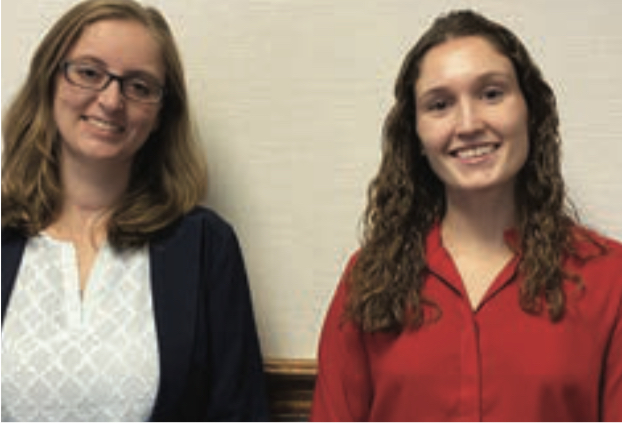In addition to your financial gifts, loyal and engaged Orange alumni help their alma mater in many other ways—from hiring graduates and hosting externs, to guest lecturing and teaching, to coaching and judging advocacy teams.
Every way you contribute makes a difference for our students, not least in the personal professional bonds that are formed among generations of Orange lawyers.
Here we offer a few vignettes about how alums have been offering their time and talent in the past year, and why they do it.
HIRING CLERKS
The Great Experience

Erin Lafayette L’13 (left) is a prime example of why it’s a great idea for students and graduates to keep in touch with the Office of Career Services. She happened to inquire about openings at just the right time in late 2013 when alumnus the Hon. Robert D. Mariani L’76, US District Judge of the US District Court for the Middle District of Pennsylvania, was looking to hire new clerks.
“I was living in California when I contacted Career Services and learned that Judge Mariani had lost a clerk,” recalls Lafayette. “So I sent in my résumé and was called in for an interview. That was in January 2014. I started two weeks later.”
Lafayette says that Judge Mariani had been on the bench in Scranton, PA, for two years at that point and decided to turn to his alma mater for law clerk candidates. “He also hired Matt Clemente L’14. Matt was hired before me, but I was the first to start. After six months of being a term clerk, it became a permanent job.”
Since Clemente and Lafayette, Judge Mariani has hired Dana Nevins L’16, Carly Rolfe L’20 (pictured, at right), and Kathrine Brisson L’20. “Judge Mariani likes to hire Syracuse graduates because of the great experience he had at the law school and because of what he got out of his education,” explains Lafayette. “Syracuse professors taught him what he needs to know, he tells me.”
Lafayette says that the variety of cases—civil rights, personal injury, constitutional matters, and first and fourth amendment issues—is part of what makes her work so satisfying.
As any clerk knows, that broad docket means plenty of research, reading, and drafting so the court runs smoothly and the judge has the information needed to pass orders and opinions. “My advice to students looking for a clerkship is focus on your writing skills,” she observes. “You must be able to write clearly, processing information and cases so you can synthesize what you learn and get to the point.”
